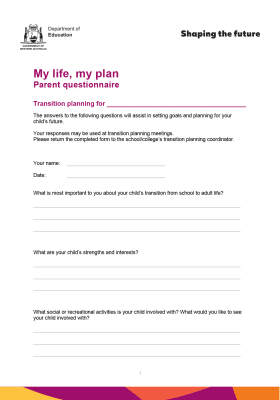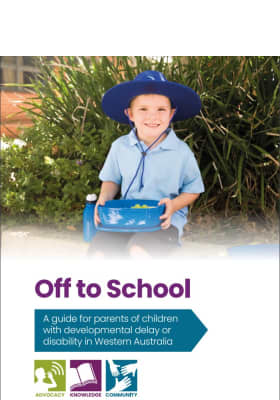Children with special education needs
Children with special education needs
We are committed to ensuring every child, including those with special education needs, has access to a high-quality education.
Education is a vital part of your children’s lives. It gives them the opportunity to learn and socialise with others, and develop friendships and the tools they need to become active members of their communities.
Choosing the right school for your children is an important decision and you should consider all the options that may be available for children with special education needs.
It is important that you are actively involved in all stages of your child’s educational development. There are moments when your child experiences significant change, such as moving to secondary school. At these times, they may need additional support. Talk to your child’s school about supporting them through a significant change.
If your child requires additional educational support, your school will work collaboratively with you and other relevant people to plan for their needs. Together, you will determine the support services and programs that are right for your child, ensuring they receive the best education and support available, tailored to their unique needs.
- Support for your child at school
- Choose the right school for your child
- Discuss your child’s needs
- Support services for schools
- Share information about your child
School staff will help you if your child requires an individual education plan. This plan is written specifically for your child to address their academic and personal needs. All staff working with your child at school will use the plan. Your input in the planning process is very important and regular reviews will be conducted to ensure the plan is current and relevant.
Your child may not need an individual education plan however most children who require a lot of changes to their education program or their environment will need one. This plan is necessary as the school receives an allocation for your child under the student-centred funding model, where funding is provided based on the needs, and the teaching and learning requirements of your child.
Student health care plans
Your child may also need a health care plan if they require health care support. Talk with a staff member at your school about the details of your child’s health needs. You will need to complete a student health care summary. Staff at your child's school can help you with this.
As a parent you want to choose the school that best suits your child, your family and your individual circumstances. The best school for your child may be your local primary or secondary school. You might also consider an education support school, education support centre, or a school with an endorsed education support program.
All schools have access to specialist teachers, school psychology services, and resources, providing your child and their school with the necessary support for an education that fully develops their knowledge, skills and understanding. If relevant, the physical school environment may be modified so your child can access facilities, to gain the most out of their school experience physically, socially and academically.
For information on schools, centres and programs for children with special educational needs or disability, refer to Choose a school.
Find information on how to enrol at a Western Australian school.
Find the list of endorsed programs for students with disability.
Once your child is settled into school, regular communication with the teacher and allied professional staff is very important.
The best way to make sure everyone is informed about your child’s needs is to make an appointment with the principal to discuss your child’s education at the school. Remember to take any recent specialist or therapist reports and other assessments that you have not given to the school. The principal may want to keep these on your child’s file.
Use these tips to help make sure meetings are mutually beneficial:
- Make a list of any issues or concerns you have.
- Share the progress and success you have observed with your child’s education program.
- Let school staff know how your child is feeling about school, their friends and achievements.
- Take a support person with you if needed.
- Agree on planned actions and desired outcomes with your child’s teacher or teachers and decide when these actions should be reviewed.
Generally, a staff member will take a record of the meeting. You may ask for a copy of this information or you may choose to take notes yourself.
If you are not satisfied for any reason, first speak with your child's teacher and then with the principal.
If required, specialist services may help your child’s school to develop your child’s individual education, wellbeing and health care plans.
These specialist services include:
- School of Special Education Needs: Behaviour and Engagement
- School of Special Educational Needs: Disability
- School of Special Educational Needs: Medical and Mental Health
- School of Special Educational Needs: Sensory (Vision and Hearing).
These services have strong community partnerships and links to other services that can also support your child and your family.
Statewide School Psychology Service
Talk with your child’s teacher or the principal if you believe support from a school psychologist may be helpful at school. Find out more about school psychology services.
You may find yourself accessing support from professionals outside the school. To get the best outcomes for your child, it is important to ensure these services all work together.
It may be helpful to provide any or all of the following information about your child to the school:
- your child’s strengths and interests
- strategies you have found effective at home
- diagnostic and general notes on your child’s condition, if relevant
- details of the people involved in your child’s care including all specialists such as psychologists, speech pathologists, physiotherapists, occupational therapists and medical practitioners
- medical records and other health information including medication requirements
- school records including individual education plans, reports and copies of education assessments
- notes from meetings with school staff and other support people which outline desired outcomes
- any research about your child’s condition which may be useful to discuss with teachers
- notes on your aspirations for your child such as milestones you hope they will reach and learning outcomes you want them to achieve.
The Department of Education is bound by law to maintain and respect confidentiality when collecting, storing and sharing information. All schools have processes for keeping records safe. Limits to confidentiality apply when information reveals a risk of harm to a child and sharing this information improves the safety of a child. School staff must report suspected child sexual abuse.
We are dedicated to ensuring that students with disability can access and participate in education on the same basis as students without disability. You can find help to understand your rights and obligations at Disability Standards for Education and also from the Nationally Consistent Collection of Data on School Students with Disability website.
Resources to assist in setting goals and planning for your child’s future
Resources to assist in setting goals and planning for your child’s future
-

My life, my plan - transition planning questions for parents and carers
Transition planning for the future – guiding questions for parents and carers.
-

My life, my plan - parent questionnaire
This questionnaire will assist in setting goals and planning for your child’s future.
-

Off to school - resource for parents and carers
A guide for parents and carers of children with developmental delay or disability.